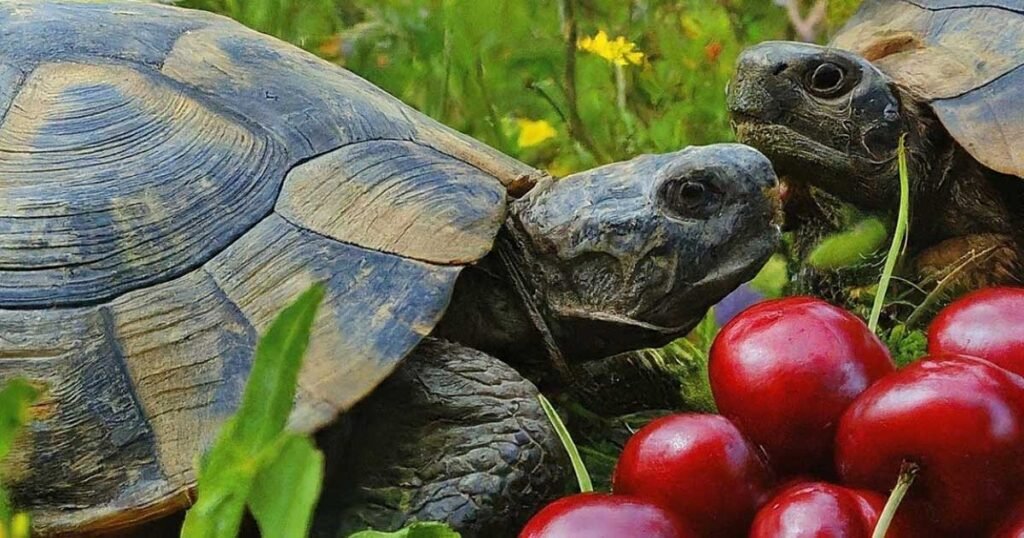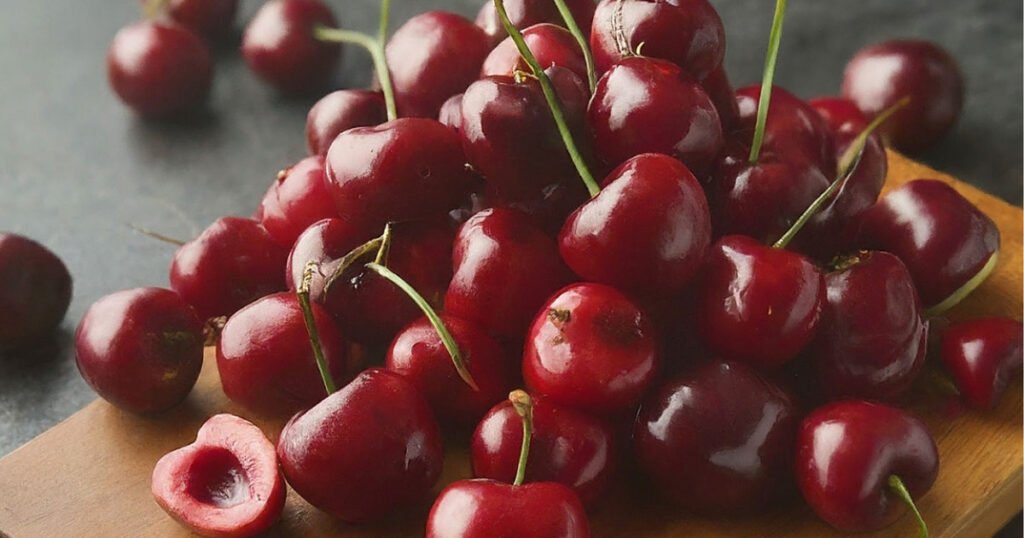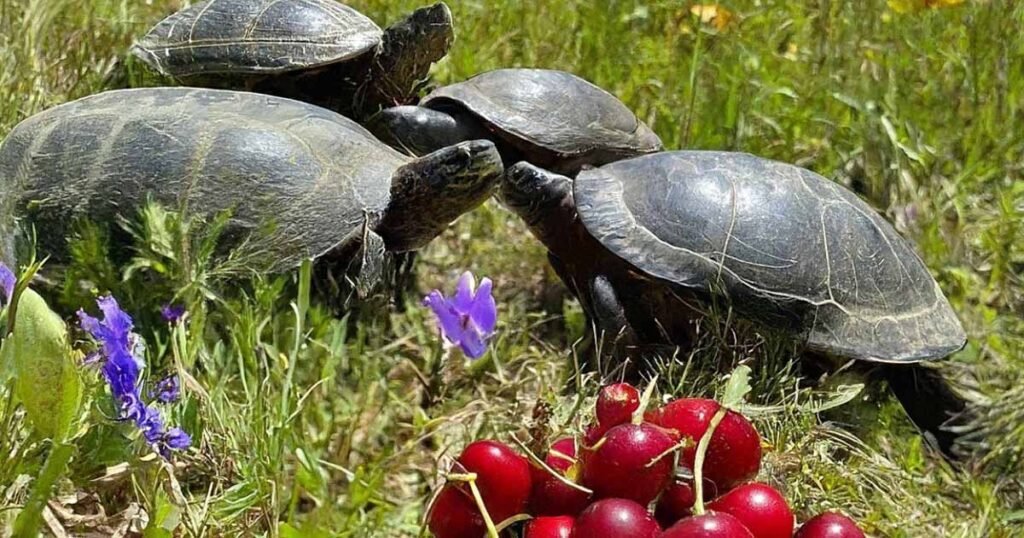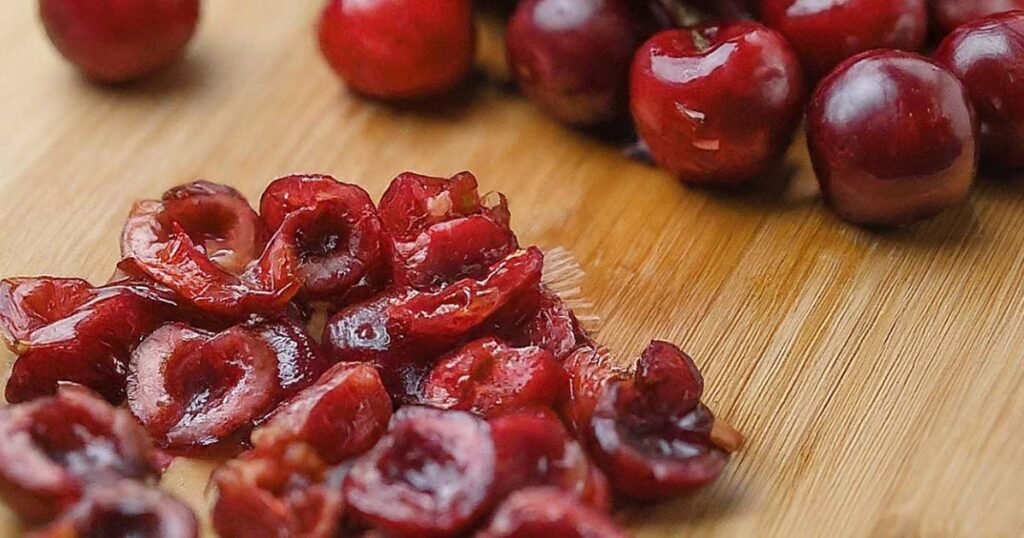Cherries are sweet and juicy and one of the most famous colorful toppings for many human desserts. These fruits are tempting snacks for humans. As a turtle pet owner, while munching on this mini delicious food, this question might come to your mind: “Can turtles eat cherries?” If you are absolutely unaware of this question, then you can add cherries to your turtle’s diet.
However, cherries’ nutritional value and turtle nutrition requirements make it complicated. You cannot add cherries to your turtle’s diet however you like. So today, we will discuss this question more: Can turtles eat cherries? Let’s dive in.
Can Turtles Eat Cherries?

Yes, turtles can indeed eat cherries. These delightful stone fruits contain moderate amounts of vitamin A and calcium, which are essential nutrients for turtles. However, you can only include this fruity snack as an occasional treat to your turtles. It’s not like you can serve cherries to your turtle every day.
Nutrition Table Of Cherries (138 grams)

Here’s a breakdown of what 1 cup of unpitted cherries contains –
| Nutrient | Amount per 1 cup (138g) |
| Calories | 87 |
| Fat | 0.3g |
| Sodium | 0mg |
| Carbohydrates | 22g |
| Fiber | 3g |
| Sugars | 17.7g |
| Protein | 1.4g |
| Vitamin C | 9.7mg |
| Potassium | 306mg |
| Calcium | 17.9mg |
| Magnesium | 15.2mg |
Nutritional Benefits of Cherries for Turtles Health

Cherries contain some healthy nutrition that is necessary for turtles’ health. Turtles need a balanced diet packed with vitamins, minerals, and calcium, and cherries have all these ingredients. However, some of the nutrition is present in small amounts.
A few cherries now and then can be a yummy and healthy treat for your shelled friends. You can think of it as a sweet treat that has some extra benefits:
Vitamin C ( Immunity Boost)
Cherries pack a tiny punch of vitamin C, a well-known immune system booster. It helps your turtle’s body fight off potential infections and stay healthy, keeping them active.
Fibre (Promotes digestive health)
Fiber is another essential component of cherries that turtles need. It supports healthy digestion by promoting gut motility and ensuring healthy stool formation. It is perfect for turtles that suffer from constipation, which is a common problem.
Minerals
Cherries aren’t a big source of minerals, but they do contain some potassium and magnesium. These minerals contribute to various bodily functions, including muscle and nerve health, keeping your turtle strong and energetic.
Calcium Source
For turtles to develop strong bones and shells, calcium is essential. While cherries contain only small amounts of calcium, when having cherries they can consume them. Incorporating cherries into your turtle’s diet can contribute to their calcium intake, supporting their skeletal health.
Antioxidant Properties
This fruit contains antioxidant properties. It depends on the variety of cherries, how much, and what kind of cherry you serve. These antioxidants, called anthocyanins, reduce inflammation and protect turtles from oxidative stress.
This means that cherries can help keep your turtle feeling good and fight off harmful elements in its environment.
Vitamin A
Cherries contain small amounts of vitamin A. This vitamin plays a vital role in maintaining the health of a turtle’s eyes, skin, and respiratory function. Cherry’s vitamin A content may not be as high as some other foods, but every bit helps your turtle.
Risks of Feeding Cherries as a Staple
Sharing a juicy cherry with your turtle might seem like a fun treat, but there are some hidden dangers to consider. While a tiny taste might be okay, cherries shouldn’t be a regular part of their diet. Here’s why:
Sugar Overload
Cherries are packed with sugar – 1 cup of unpitted cherry(around 138 grams) contains up to 17.7 grams of sugar. This high amount of sugar can be challenging for a turtle’s belly to handle. Too much sugar can lead to weight gain and even diabetes in turtles, just like us. However, there’s no way that you will be serving them 138g of cherries at a time. Still, you have to consider the risk.
Tummy Troubles
The acidity in cherries (with a pH level ranging from 3.2 to 4.0) can irritate your turtle’s digestive system. It can cause diarrhea and uncomfortable heartburn.
Pesticide Threat
There’s a chance cherries are grown with pesticides because these days, most farmers use toxins to kill insects. These chemicals can build up in your turtle’s body and make them sick. If you can, try to get organic cherries and wash them well before giving them to your pet.
Choking Hazard
Whole cherries can be a choking hazard, especially for small turtles. Whenever you give your turtle cherry treats, make sure you supervise and cut them up into smaller pieces.
Pit Problems
Cherry pits have a substance that can turn into cyanide, a poisonous substance. Make sure to remove the pit altogether before offering cherries to your turtle.
Safe Cherry Serving Tips For Turtles

So, now that we know the benefits and risks of cherries for your turtle let’s dig into some of the simple feeding tips:
- Fresh & Pit-Free: Always offer fresh cherries to your turtle friend. Wash them thoroughly and remove the pit altogether. Cherry pits can be a choking hazard, as we already mentioned above, so make sure they’re removed before serving.
- Bite-Sized Treats: Cut the cherries into small pieces that are easy for your turtle to manage. It helps prevent choking and makes digestion smoother.
- Cleanliness is Key: Practice good hygiene. Wash your hands and any utensils you use to prepare and serve the cherries. It prevents bacteria from making your turtle sick.
- Watchful Eye: Keep an eye on your turtle while they enjoy their cherry treat. It allows you to make sure they’re eating cherries safely and without any problems.
Can Turtles Eat Cherry Pit?
Absolutely no; cherry pits are dangerous for turtles and should never be offered. The pit contains a chemical called amygdalin, which turns into cyanide when chewed or digested. Cyanide is poisonous and can harm your turtle.
Many turtle owners online, across different forums, all recommend removing the pits before giving cherries to their turtles. The amount of amygdalin in the pit can vary depending on the cherry type, but it’s always best to be safe and remove them altogether.
Can Turtles Eat Dried Cherries?
Fresh cherries might seem like a great treat, but dried cherries shouldn’t be on a turtle’s menu. Here’s why: Dried fruits concentrate their sugar content during the drying process. A third of a cup of dried cherries is full of 30 grams of sugar. This high amount of sugar can be difficult for your turtle to digest and could lead to health problems.
Can Turtles Eat Canned Cherries?
Even though canned cherries seem tempting, they’re not the best choice for turtles. They’re usually packed in sugary syrups or juices, which are way too high in sugar for turtles. Can you imagine a cup of canned cherries with 15 teaspoons of sugar? That’s a lot for a little turtle to handle.
FAQs
Can box turtles eat cherries?
Absolutely, box turtles can enjoy a cherry treat on occasion. But remember, cherries shouldn’t be the main course. A box turtle needs protein, which cherries don’t have, but cherries contain calcium in small amounts that turtles need in their diet. Limit cherries or any other sweet fruit to 10-15% of your turtle’s diet.
Can turtles eat cherry tomatoes?
Yes, turtles can safely eat cherry tomatoes in the right balance. They’re stuffed with vitamins and minerals that help keep your shelled friend healthy. Also, they’re low in calories, so they are a guilt-free treat. You should also make sure your turtle’s diet includes other healthy options besides cherry tomatoes.
Can aquatic turtles eat cherries?
Yes, aquatic turtles can eat cherries in moderation! They’re not a natural food, so introduce them slowly. You should maintain a balanced, regular diet with occasional cherry treats.
Read More: What Do Russian Turtles Eat?
Wrapping Up
So, the verdict on cherries for turtles? They can be a fun occasional treat, but remember, moderate consumption is vital. Their main course should be filled with protein and calcium.
Also, there are plenty of other yummy foods turtles can enjoy, like worms, crickets, leafy greens, and vegetables. The best thing is to offer a variety of healthy foods to keep your turtle happy and growing.
